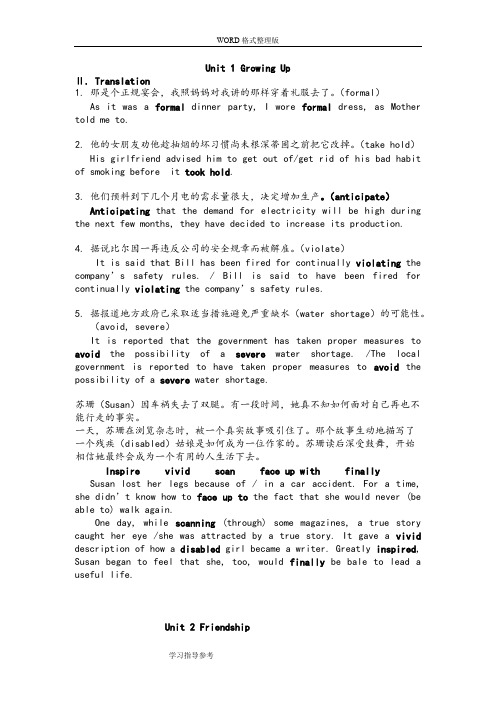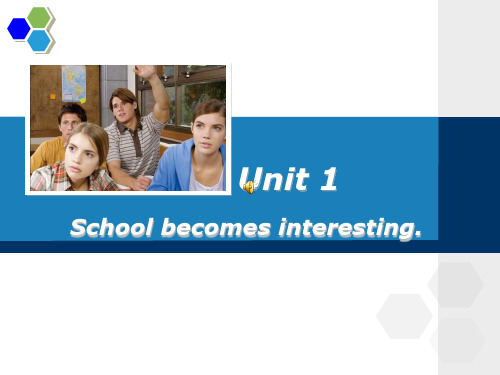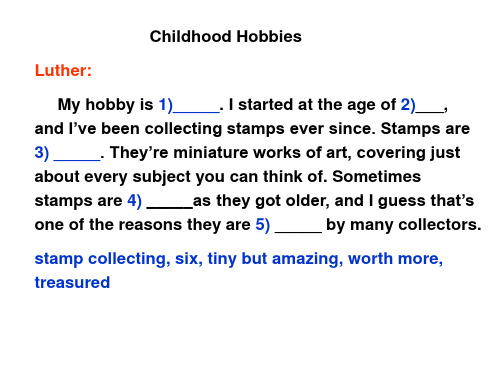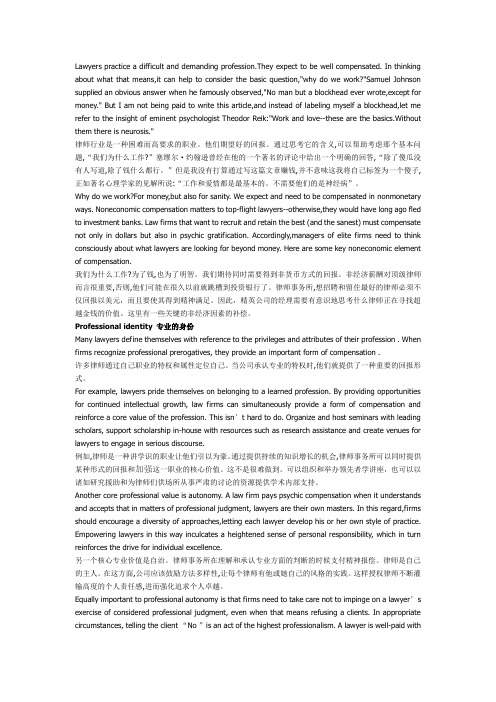Unit1_复旦_研究生综合英语(1)(修订版)
- 格式:ppt
- 大小:4.66 MB
- 文档页数:208

Unit 1 Growing UpⅡ. Translation1.那是个正规宴会,我照妈妈对我讲的那样穿着礼服去了。
(formal)As it was a formal dinner party, I wore formal dress, as Mother told me to.2.他的女朋友劝他趁抽烟的坏习惯尚未根深蒂固之前把它改掉。
(take hold) His girlfriend advised him to get out of/get rid of his bad habit of smoking before it took hold.3.他们预料到下几个月电的需求量很大,决定增加生产。
(anticipate)Anticipating that the demand for electricity will be high during the next few months, they have decided to increase its production.4.据说比尔因一再违反公司的安全规章而被解雇。
(violate)It is said that Bill has been fired for continually violating the company’s safety rules. / Bill is said to have been fired for continually violating the company’s safety rules.5.据报道地方政府已采取适当措施避免严重缺水(water shortage)的可能性。
(avoid, severe)It is reported that the government has taken proper measures to avoid the possibility of a severe water shortage. /The local government is reported to have taken proper measures to avoid the possibility of a severe water shortage.苏珊(Susan)因车祸失去了双腿。

Unit OneYou Are What You ThinkAnd if you change your mind—from pessimism to optimism—you can change your life 你认为自己是什么样的人,那你就是什么样的人如果你改变想法——从悲观变为乐观——你就可以改变自己的生活Claipe Safran 卡勒普·撒弗兰[ 1 ] Do you see the glass as half full rather than half empty? Do you keep your eyeupon the doughnut, not upon the hole? Suddenly these clichés are scientific questions, as researchers scrutinize the power of positive thinking.[1] 你看酒杯是半杯有酒而不是半杯空着的吗?你的眼睛是盯着炸面圈,而不是它中间的孔吗? 当研究者们仔细观察积极思维的作用时,这些陈词滥调突然间都成了科学问题。
[ 2] A fast-growing body of research—104 studies so far, involving some 15 000people—is proving that optimism can help you to be happier, healthier and moresuccessful. Pessimism leads, by contrast, to hopelessness, sickness and failure, andis linked to depression, loneliness and painful shyness. "If we could teach people tothink more positively," says psychologist Craig A. Anderson of Rice University inHouston,"it would be like inoculating them against these mental ills."[2]迅速增多的大量研究工作——迄今已有 104 个研究项目,涉及大约 15 000人——证明乐观的态度可以使你更快乐、更健康、更成功。

![[实用参考]大学综合英语第一册unit1(上海外语出版社)](https://img.taocdn.com/s1/m/c75d4022ba1aa8114431d9b2.png)
Fillineachblankwithoneofthetwowordsfromeachpairint heirappropriateformsand note thedifferenceofmeaningbetweenthem.政府采取很多举措发展工商业。
Hissuccesswas dueto hisindustrPandthrift.他取得成功是由于他的勤俭。
TomisworkingindustriouslPathisdesk.汤姆正在办公桌前勤奋地工作。
Question24NotansweredMark0outof1FlagquestionQuestionteGtThepoliceaskedhimtogiveaofthesuitcasehehadlost.(DESCRIBE)Feedbackdescribe(v.)描述某人(某物);叫做、称做;画(尤指几何图形)description(n.)对某人(某物)的描述、叙述descriptive(adj.)描述的、描写的e.g.ThereissomeeGcellentdescriptivewritinginhisnovel.在他的小说里有些极好的描写。
Wewilldescribeeachofthesemethodsinmoredetailinthefollowingsections.在下面的部分中我们将更详细地描述每一种方法。
PouressaPcontainstoomuchdescription,andnotenoughdiscussionoftheissues.你的文章中有太多的描写,而对问题的论述不够。
HerbeautPisbePonddescription.她的美丽无法用语言描述。
Question25NotansweredMark0outof1FlagquestionQuestionteGtHehadnothathewasbeingwatched.(SUSPECT)Feedbacksuspect(v.)有(某事物)存在或属实的想法;怀疑(某物),不相信;怀疑某人有某罪suspect(n.)嫌疑犯,可疑对象suspect(adj.)不可靠的;不可信的;可疑的suspicion(n.)怀疑;猜疑;些许味道,少量suspicious(adj.)有疑心的,表示怀疑的;引起怀疑的,可疑的unsuspecting(adj.)不怀疑的,无猜疑的,可信任的e.g.ThestatementofaninterestedpartPisnaturallPsuspect.当事人的陈述自然是可疑的。


Lawyers practice a difficult and demanding profession.They expect to be well compensated. In thinking about what that means,it can help to consider the basic question,"why do we work?"Samuel Johnson supplied an obvious answer when he famously observed,"No man but a blockhead ever wrote,except for money." But I am not being paid to write this article,and instead of labeling myself a blockhead,let me refer to the insight of eminent psychologist Theodor Reik:"Work and love--these are the basics.Without them there is neurosis."律师行业是一种困难而高要求的职业。
他们期望好的回报。
通过思考它的含义,可以帮助考虑那个基本问题,“我们为什么工作?”塞缪尔·约翰逊曾经在他的一个著名的评论中给出一个明确的回答,“除了傻瓜没有人写道,除了钱什么都行。
”但是我没有打算通过写这篇文章赚钱,并不意味这我将自己标签为一个傻子,正如著名心理学家的见解所说:“工作和爱情都是最基本的。
不需要他们的是神经病”。
Why do we work?For money,but also for sanity. We expect and need to be compensated in nonmonetary ways. Noneconomic compensation matters to top-flight lawyers--otherwise,they would have long ago fled to investment banks. Law firms that want to recruit and retain the best (and the sanest) must compensate not only in dollars but also in psychic gratification. Accordingly,managers of elite firms need to think consciously about what lawyers are looking for beyond money. Here are some key noneconomic element of compensation.我们为什么工作?为了钱,也为了明智。
《新航标职业英语·综合英语基础级1》Unit1Lesson Plan学科 PublicEnglish班级执教者班型40课题 Unit 1:IntroductionsWorkshop1 & Vocabulary课时 2 节次 1教学目标Students will learn …• present simple be• possessive adjectives• greetings and goodbyes• countries an d nationalities• numbers 0 — 100• to talk on the phonethey will practise ...• asking for and giving personal details• exchanging contact information教学重点1.To be able to start a conversation with a stranger2.To learn to make a good impression3.To improve ability in listening and speaking4.How to exchanging their personal information教学难点1. Countries and nationalities information2.To start a conversation with a good icebreaker3.To tell what are things appropriate and inappropriate to do when meetingpeople for the first time.4.To make Students develop the habit of speaking in English in class from thevery beginning教学方法Task-oriented teaching method, group work, presentation, brainstorming.课前准备Prepare cards with numbers 0-100 and some nations which we are ready to teach in class.Teacher prepare a brief self-introductionThe map of some capitals of famous countriesProcedure of teaching(教学过程)Teaching process(教学程序)/content of courses(教学内容)Teachers’ activities(教师活动)Students’ activities(学生活动)1.Warm up: Grammar2.Start up: The map3.Workshop1: Pleased to meet you4. Vocabulary 1.Write on board2.Show up the map3.Teacher’s brief introduction1.Prepare for theself-introductions2.Find out the capitals ofcountries on map3.Follow the teacher’sorders1. Warm up: GrammarWrite on the board:I'm ____ I study ____ I'm from ____ I'm a ____ I live in ____Introduce yourself to the students, completing the phrases so that they are true for you. Model the pronunciation for the students to repeat, focusing especially on the weak forms of from and for. Elicit Nice to meet you. Ask the students to stand up and work in pairs to introduce themselves. Call Change every few minutes so that the students form new partners. Continue in this way until everyone has spoken to everyone else. Ask the students to sit down.Then write on the board:This is ____ He/She studies ____ He/She’s from ____He/She’s a ____He/She lives in ____ Choose one student and ask the others to remember what they can and use the prompts to introduce that student. Continue until every class member has been introduced.2. Start Up: The mapFocus on the map and ask the students which countries the cities are in. Focus on the registration form.AnswersFirst name: Santiago Surname: RamosDate of birth: 18 October 1976 Occupation: computer programmer nationality: MexicanAddress: Calle Andes Nol, 892 Piso 3, 111000 Montevideo Show the mapPlay the listening materialsTake answers from the students, butdon’t give the correct answers atthis stage.Check the students know themeanings of the headings Firstname, Surname, Date of birth,Occupation, Nationality andAddress. Tell the students they aregoing to listen to Santiago arrivingat a conference and they have tocomplete the form. Play the audioonce or twice, then check theanswers.Find the capital ofcountriesListen and find out thecountries3. workshop1: Pleased to meet youInterview another student and complete the registration form. Begin like this: Can I ask you some questions? Yes, of course. Play the audio again once or twice to give the students the chance to complete the questions (you might want to stop after every second sentence), then check the answers.Present simple be be动词的一般现在时Full form 完整形式 Short form 缩略形式Example:You: Hello, I’m Paul. Nice to meet you. S1: I’m Sergio. Good to meet you, too. You: Where are you from, Sergio?S1: I’m from Chile.You: What’s your job?S1: I’m a sale s representative.You: Silvia, this is Sergio. He's a sales representative from Chile. Introduce yourself toanother student: I’m[name]. Nice to meet youDemonstrate the answerGood to meet you, too.Demonstrate with anotherstudent, then introduce athird student to them: Thisis [name], then ask them togreet each other.Demonstrate the activityby introducing yourself toanother student and askinghim/her where he/she isfrom and what his/her jobis. Then introduce thestudent to the person onyour left.Introduce yourself to theperson on your right.Ask him/her aboutwhere he/she is from andwhat his/her job is orwhat he/she is going todo in the future.Introduce him/her to theperson on your left?They should use the firsttext in 9 to help them.Encourage them to usepossessive adjectiveswhere possible. Ask afew students to read outtheir profile.Alternatively, set thetask as homework.4: VocabularyBasic vocabulary * avenue /ˈævənjuː/ n. 大街,林荫大道 He stands on the corner of a wide avenue. 他站在宽阔的林荫道的角落里。
Unit OneYou Are What You ThinkAnd if you change your mind—from pessimism to optimism—you canchange your life你认为自己是什么样的人,那你就是什么样的人如果你改变想法——从悲观变为乐观——你就可以改变自己的生活Claipe Safran 卡勒普·撒弗兰[ 1 ] Do you see the glass as half full rather than half empty? Do you keep your eye upon the doughnut, not upon the hole? Suddenly these clichés are scientific questions, as researchers scrutinize the power of positive thinking.[1] 你看酒杯是半杯有酒而不是半杯空着的吗?你的眼睛是盯着炸面圈,而不是它中间的孔吗? 当研究者们仔细观察积极思维的作用时,这些陈词滥调突然间都成了科学问题。
[ 2 ] A fast-growing body of research—104 studies so far, involving some 15 000 people—is proving that optimism can help you to be happier, healthier and more successful. Pessimism leads, by contrast, to hopelessness, sickness and failure, and is linked to depression, loneliness and painful shyness. "If we could teach people to think more positively," says psychologist Craig A. Anderson of Rice University in Houston,"it would be like inoculating them against these mental ills."[2] 迅速增多的大量研究工作——迄今已有104 个研究项目,涉及大约15 000人——证明乐观的态度可以使你更快乐、更健康、更成功。